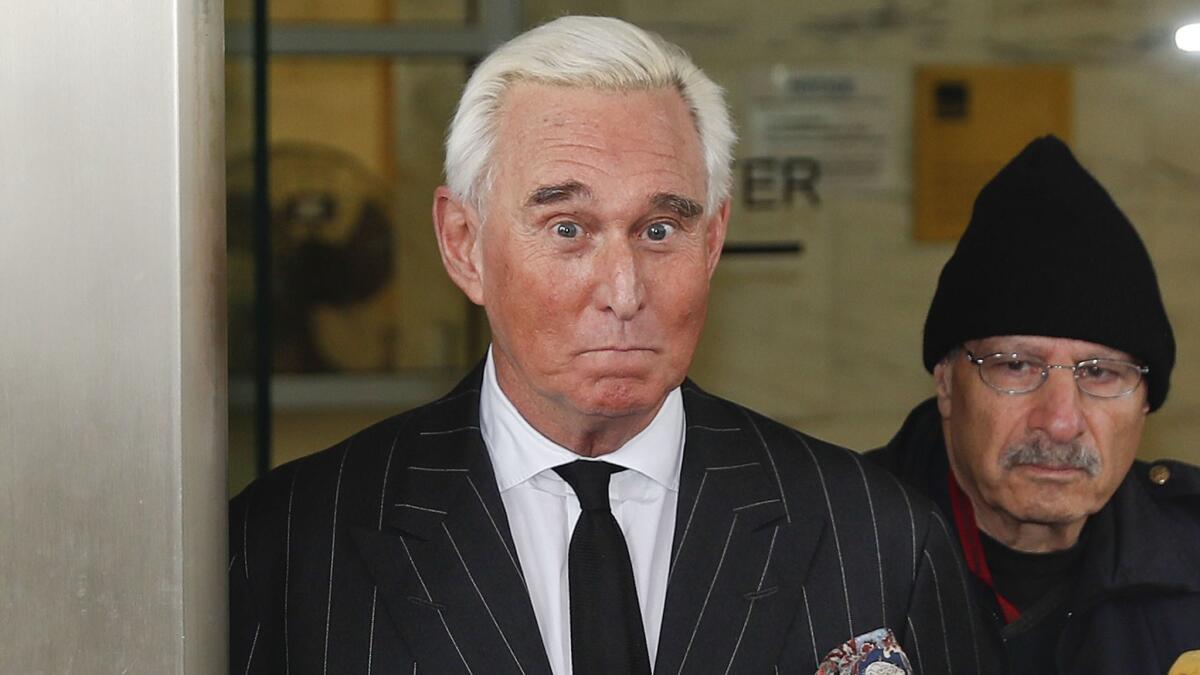Judge issues gag order for Roger Stone case in Russia investigation

- Share via
Reporting from Washington — A federal judge has ordered Roger Stone, President Trump’s longtime political advisor, to limit his public comments about his upcoming trial on charges stemming from the special counsel’s Russia investigation.
The gag order could be a challenge for Stone, an outspoken provocateur who has held news conferences, granted interviews, taunted prosecutors and publicly criticized the Russia probe since he was arrested on Jan. 25 at his home in Fort Lauderdale, Fla.
Gag orders are generally intended to stop lawyers and defendants from trying the case in public and saying anything that could prejudice a jury and undermine a fair trial.
The order, by U.S. District Judge Amy Berman Jackson, appeared aimed more at Stone’s lawyers than at him.
In order to safeguard the defendant’s right to a fair trial, she wrote, “counsel for the parties and the witnesses must refrain from making statements to the media or in public settings that pose a substantial likelihood of material prejudice to this case.”
The judge also warned that she could consider further restricting Stone’s comments if his media tour continues.
Saying it was not up to the court to “advise the defendant as to whether a succession of public statements” were in his best interest, Jackson cautioned that those statements would be considered in “any future request for relief based on pretrial publicity.”
Although the order also applies to prosecutors, they have already been tight-lipped about the case.
Jackson placed an extra emphasis on barring comments from all participants, including Stone, while “entering or exiting the courthouse,” where reporters and protestors have staked out the proceedings.
Stone hasn’t spoken to reporters outside the Washington courthouse where his trial will take place, but he staged a raucous news conference on the steps of the federal courthouse in Fort Lauderdale where he made his first appearance before a judge after his arrest.
Special counsel Robert S. Mueller III accused Stone of lying about his conversations involving WikiLeaks, which posted thousands of hacked Democratic Party emails during the 2016 presidential campaign.
Stone has pleaded not guilty to seven charges of making false statements and witness tampering. A trial date has not been set.
Jackson imposed a similar gag order on Paul Manafort and Rick Gates, the former chairman and deputy chairman, respectively, of Trump’s presidential campaign during their prosecution by Mueller’s office.
The judge diligently policed the issue, chiding Manafort when he ghost-wrote a column for an English-language newspaper in Ukraine. She also scolded Gates when he recorded a video message for a fundraiser for his legal defense fund.
Manafort ultimately was convicted of bank fraud and tax evasion related to his work as a political consultant in Ukraine, then he pleaded guilty to two charges of conspiracy. He is awaiting sentencing.
Gates pleaded guilty to one charge of false statements and one charge of conspiracy. He is cooperating with prosecutors and has not been sentenced.
Follow the latest news of the Trump administration on Essential Washington »
Unlike those defendants, Stone has spent decades embracing a colorful image as a dirty trickster.
After his arrest, he tried to counter Mueller’s indictment with a scorched-earth media tour, including sharing security camera footage showing armed FBI agents arriving at his house.
Stone accused them of a “Gestapo-style raid” and has sold T-shirts that say “Roger Stone Did Nothing Wrong” to raise money to pay his lawyers.
During Stone’s first court hearing before Jackson on Feb. 1, she warned him, saying, “This is a criminal case, not a public relations campaign.”
But Stone reveled in the attention. The day after the hearing, he was trading cheek kisses and shaking hands with supporters at the Trump International Hotel in Washington, where he pledged to “put up a vigorous defense” at trial.
The special counsel’s office supported a gag order because, it argued, Stone was trying to garner sympathetic media coverage that could prejudice a jury.
“A considerable amount of that media attention has been devoted to extrajudicial statements of the defendant himself,” prosecutors wrote in a proposed order. “These statements create the risk that the defendant will seek to use media coverage of this case to gain favorable attention.”
Stone’s statements “create a substantial risk of tainting the jury pool.”
Stone’s lawyers argued that his colorful comments were unlikely to hamper the ability to find impartial jurors amid the widespread coverage of the Russia investigation.
“No evidence exists that would provide a clear and convincing basis for concluding that any of Mr. Stone’s free speech exercise presents a clear and present danger to a fair trial,” the lawyers wrote.
While Kim Kardashian has 126 million followers on Instagram, they wrote, Stone has only 39,000 people who track his daily missives.
One post after his arrest shows Stone with a piece of duct tape across his mouth and a caption that blames the “Mueller hit squad.”
“While Roger Stone may be familiar to those who closely follow American politics, he is hardly ubiquitous in the larger landscape of popular consciousness,” the lawyers wrote.
More to Read
Get the L.A. Times Politics newsletter
Deeply reported insights into legislation, politics and policy from Sacramento, Washington and beyond. In your inbox three times per week.
You may occasionally receive promotional content from the Los Angeles Times.











